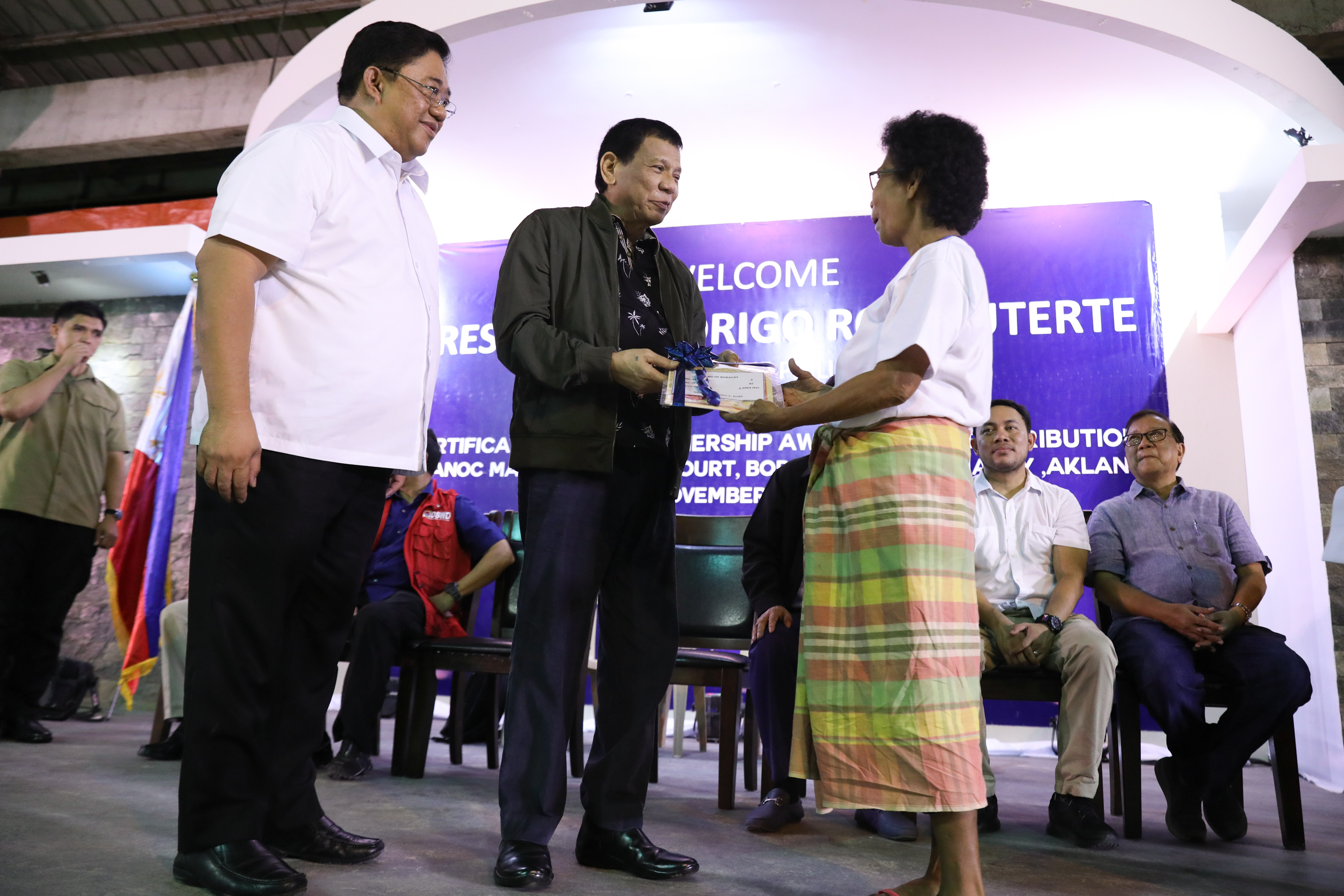44 Ati families now Boracay landowners

LAND REFORM President Duterte, assisted by Agrarian Reform Secretary John Castriciones (left), hands out a certificate of land ownership award to a representative of an Ati family on Boracay Island. —MALACAÑANG PHOTO
BORACAY ISLAND, AKLAN—Till the land for the benefit of your children.
This was President Duterte’s message to land reform beneficiaries in Aklan province, among them Ati families on Boracay Island, when he distributed certificates of land ownership award (Cloa) on Thursday.
The President assured them of assistance so they could reap the benefits of the land that they now own.
Mr. Duterte said the new landowners’ grandchildren could even make more money by selling the land in the future.
“If I were you, make it self-productive. And someday, sell it. At least your children and grandchildren will be millionaires. So in the meantime, make it productive and when the [prohibition] period is over, you can sell it and make millions [of pesos],” he said.
“So there will be Atis here who will be rich someday,” he added.
Ati landowners
The President made the remarks after leading the distribution of Cloa to 484 beneficiaries from Aklan in a program held at Barangay Manoc-Manoc here.
He distributed 623 Cloa covering 274 hectares in the towns of Buruanga, Tangalan and Malay. Forty-four Ati families in Boracay, which is part of Malay, received five collective Cloa covering 3.2 ha.
In April, days after Malacañang announced that Boracay would be shut down for a six-month environmental rehabilitation, President Duterte, to the surprise of many, declared the 1,032-ha resort island an agrarian reform area.
The law classifies the country’s leading tourist destination as an agricultural and forest area, the President said.
An initial assessment, however, showed that land reform might not be possible on the island because it only had 4 ha of arable land.
But Mr. Duterte, in May and June, defended the planned land reform in Boracay. He said the land would be given to the Ati tribe, considered the earliest settlers on the island.
The government, through the National Commission on Indigenous Peoples, issued in 2011 a Certificate of Ancestral Domain Title (CADT) to the Ati tribe covering a 2.1-ha beach front property at Barangay Manoc-Manoc, one of three villages of Boracay.
The community occupies only a portion of the CADT-covered property due to ownership disputes.
Gov’t assistance
“To the agrarian reform beneficiaries . . . here in Aklan, I extend my warmest greetings to all of you as you become full-fledged owners of the lands that you have been tilling for the longest time,” Mr. Duterte said.
“I assure you that this administration will continue to protect and uphold your right to own, control, secure, cultivate, enhance and reap the benefits of the agricultural lands you till,” he said.
Earlier, the Department of Agrarian Reform (DAR) said land reform beneficiaries would be trained so they could properly utilize the land.
They will also receive garden kits and farming tools, Agrarian Reform Secretary John Castriciones said.
Mr. Duterte said Agriculture Secretary Manny Piñol would be tasked to provide beneficiaries with fertilizer and seedlings.
“I have directed all concerned government agencies to work towards agricultural productivity and environmental integrity through policies and programs that will cascade to the countryside,” he said.
Stephen Leonidas, DAR regional director for Western Visayas, said his office would introduce farming technologies and training to Ati beneficiaries to prepare them in cultivating their lands. —WITH REPORTS FROM HAZEL VILLA AND INQUIRER RESEARCH